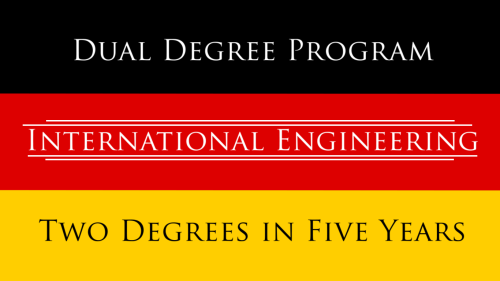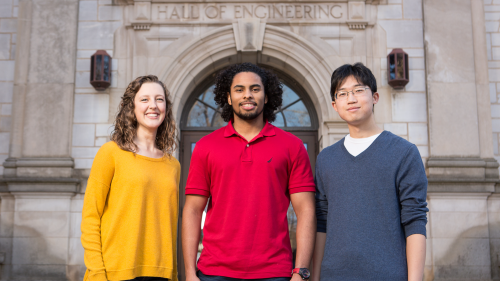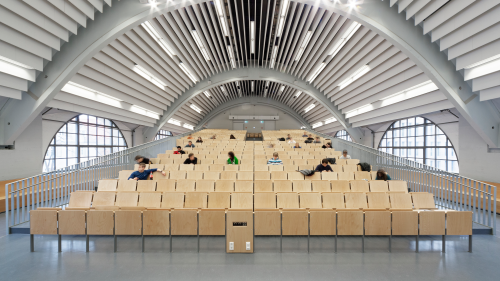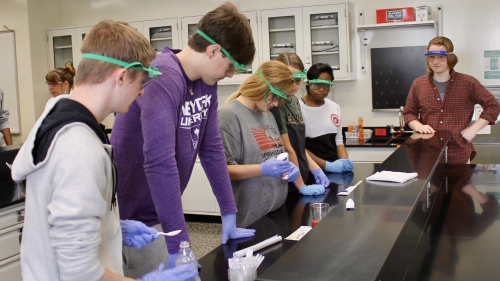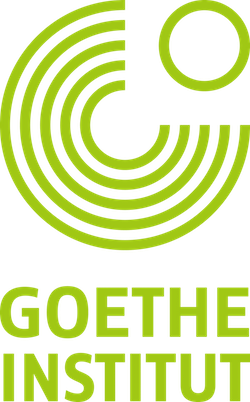German Sandbox
Why Study German at the UofA?

Our German program offers solid career opportunities, and we encourage our students to not only study abroad but also work and research abroad. We partner with Cultural Vistas to help students secure internships abroad in their major fields. The International Engineering Program allows students to earn both a BS in engineering and a BA in German in just five years, spending their fourth year abroad studying abroad and working at a German company. It is one of only three programs of its type in the United States. We offer internationally recognized proficiency certification to all majors as an official Goethe Institute testing center, which allows our students to prove their abilities to future employers and graduate programs.
In addition to traditional courses on German language and literature, we teach innovative courses aligned with faculty research that allow students to explore individual topics in greater detail such as: the German Graphic Novel, Professional German, German Cinema, Migration and National Identity, and Germany and the Holocaust: The Significance of the Holocaust in Differentiated Contexts.
Plus, German is easier than you think! You are currently reading a Germanic language, English. Although it has many loan words from Romance languages, English shares many sentence structures and vocabulary with German. Try matching German and English in this quick quiz:
A. I know your uncle.
B. Anna is learning English.
C. My sister has blond hair.
D. The book is long.
E. That is an apple.
1. Das Buch ist lang.
2. Meine Schwester hat blondes Haar.
3. Das ist ein Apfel.
4. Ich kenne deinen Onkel.
5. Anna lernt Englisch.
A=4, B=5, C=2, D=1, E=3.
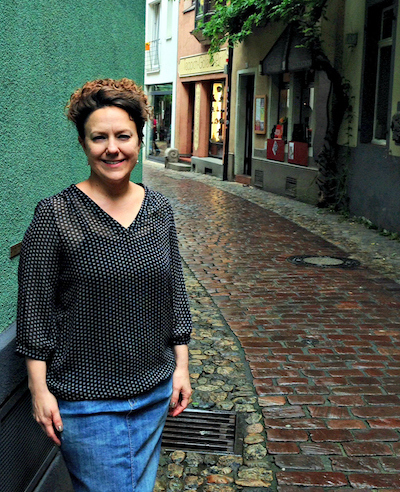
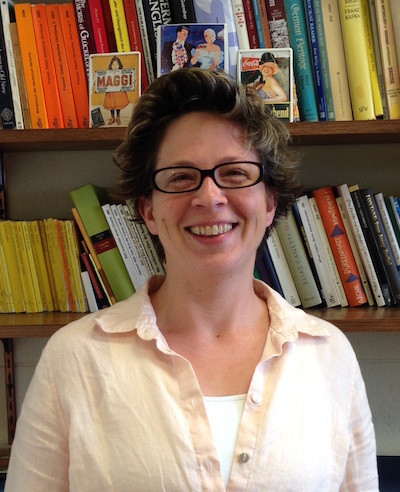
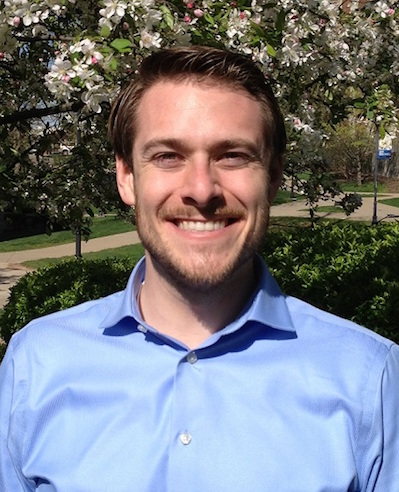

Meet our German instructors and TAs in our departmental directory.
How is German Important Today?
German is the most widely spoken language in Europe, and Germany has a long history as a high tech center that continues today. The nation is a leader in multiple fields of business and STEM, such as the automotive, biotechnology, alternative energy, pharmaceuticals, and computer science sectors, and the German economy drives the European Union.
German additionally gives you access to the rich, world-renowned cultural achievements of the German-speaking countries—contributions by names such as Mozart, Bach, Beethoven, Klimt, Goethe, Kafka, Marx, Nietzsche, and Freud are among those you might recognize. German Americans are the largest heritage group in the US. Kindergarten, Christmas trees, and Levi jeans were all introduced by German-Americans.
UNIQUE ASPECTS OF OUR GERMAN PROGRAM
The International Engineering Program (IEP) gives students the opportunity to earn two degrees in five years—a BS in engineering and a BA in German. It is open to students in all fields of engineering. Students spend their fourth year studying abroad for a semester at the Technische Universität Darmstadt (Technical University of Darmstadt) followed by a paid internship with a German company. Interested students should review this page on the College of Engineering website for more information and application instructions.
Language Proficiency Certification
The Goethe Institut Exams are part of the European Union's Common Framework of Reference for Languages. The administration of the exams is supported by the German government in over 130 countries around the world and offers concrete proof of proficiency to future employers and graduate schools. As one of the largest testing sites in the entire southern region, our German program is able to offer students the B1, B2, and C1 exams; the B1 exam is the exam required by the German government for citizenship. Exams are held each year on a Saturday in the spring, usually April.
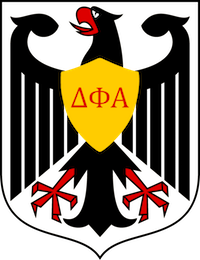
National German Honors Society
The Arkansas Iota Xi chapter of the National German Honors Society, Delta Phi Alpha, was established in 1983. We have held an annual initiation every year since, and our membership now includes over 500 members, making us one of the most active chapters in the country. Students must have an overall B- average, a B+ average in German, be of sophomore standing or above, and have taken at least one junior level class.
Additional Major for Other Colleges
Students who are studying in the Walton College of Business, the College of Engineering, the College of Education and Health Professions, the Bumpers College of Agricultural, Food, and Life Sciences, and the Jones School of Architecture have another option available known as the additional major (AMGERM). It allows students to add German as an additional major by completing the 24 hours of upper level coursework (3000-5000 level classes) without having to take the other major requirements for the traditional major. So, for example, this makes it easy for students to double major in German and business, German and engineering, German and hospitality, etc.
Courses in Our German Program
Each semester, the German section offers Elementary German I (GERM 1003), Elementary German II (GERM 1013), Intermediate German I (GERM 2003), and Intermediate German II (GERM 2013). We additionally offer advanced classes for students pursuing a German major or minor. The complete list of course offerings can be found in the course catalog.
Mondays, 4:10 PM - 6:40 PM.
German M.A. Program
Graduate students pursuing the M.A. program World Languages with a concentration in German take a variety of courses in preparation for the comprehensive M.A. exam, e.g., the history and theory of literary genres, representative authors of the chief historical periods, and thematic approaches to literature such as Faust, the modern city, literature and film, or the Holocaust. In addition to the course offerings of the German program, students have options in pursuing individual interests in comparative literature, history, literary translation, art history, gender studies, or pedagogy. Students may also wish to take classes in Business German or become certified in community college teaching.
The M.A. program provides a solid preparation for students who intend to go on for the Ph.D., enabling them to compete successfully at highly prestigious schools. Its comprehensive curriculum also provides a sound base for career opportunities in education, government, and in a corporate environment.
A low student-faculty ratio allows our dedicated, professionally-active faculty to offer students support and mentoring. The German Club, the German film series, and the weekly Stammtisch add to the congenial atmosphere and cultural enrichment of the program.
The program requires either an oral interview or a tape of the candidate's spoken German. Teaching Assistantships are also available - find out more about being a TA here.
For more info on the German M.A. program, contact the graduate advisor and TA coordinator, Dr. Brett Sterling. If you're interested in applying, download the German MA Materials checklist for a quick list of everything you need.
Professional & Academic Opportunities for German Speakers
RISE is an excellent opportunity for students in biology, chemistry, physics, earth sciences and engineering to work in paid summer positions in German doctoral laboratories. A part of the DAAD (Deutscher Akademischer Austauschdienst, German Academic Exchange Service), this program is extremely competitive and open to students in all of North America and Great Britain. U of A students have done very well in this competition.
The main factors in success are a high GPA and strong letters written by professors with whom the student has conducted laboratory research. Students must be sophomores to apply. Positions are available all over Germany and vary in length from six weeks to three months. German is not required since the language of the labs is English, but since students live in cities in which not all citizens can or want to speak English, at least two semesters of German are recommended. Students who have taken at least four semesters of German before participating in this program are eligible to earn three hours of conversation credit by Credit by Examination; see Dr. Condray for details.
Cultural Vistas offers internships in your field with German companies during the summer months; pay varies by field, and students can apply for stipends for un-paid internships. They also have options for semester and year-long internships as well.
The more German one knows, the higher the level of the placement. For example, one logistics major with a good command of German just finished an internship at BMW, and another business major received an assignment in Berlin as a manager for on-line marketing in the American market. Applications are due in December the summer before one wishes to go abroad.
For more information, please visit this page.
For more information, please visit this page.
For more information, please visit this page.
For a list of courses, please visit DAAD's website here.
Read more about programs in Germany.
Read more about programs in Austria.
Recommended Study Abroad Programs
German students at the U of A have the opportunity to study, work, or research abroad for a summer, semester, or year. The programs that we partner with are listed below, but we also often work with students who are interested in a particular city or field to make sure their credit transfers. So, for example, one student studied piano in Freiburg, Germany and another art history in Vienna, Austria.
Whether in one of the programs below or another, students should meet with the undergraduate advisor, Dr. Condray, before making plans to study abroad in order to discuss program aspects and transfer credit.
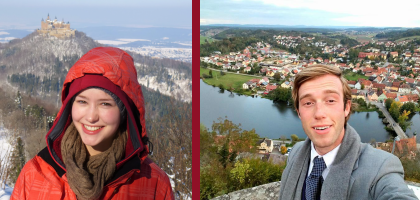
Direct Exchange Programs
Direct exchanges allow students to trade places with students at institutions abroad, thereby significantly reducing study abroad costs. Students take real university courses with native speakers and live in dormitories. The U of A offers three direct exchanges in German-speaking countries.
Graz is the direct exchange of the University of Arkansas, which means that students essentially pay no more to attend classes in Austria than on our home campus, since they are trading places with Austrian students. Graz is a beautiful mountain town with hiking and skiing that was named a UNESCO World Heritage Site.
Students live in dormitories and receive special help from Austrian student partners who have either studied at the U of A or intend to. Any course taken in German above the B2 level is eligible for German major or minor credit; thus, one student was able to earn 20 hours of advanced German credit during a year’s study in Graz. Students take an intensive preparation class in German language before attending regular university classes alongside native speakers.
Visit the Hogs Abroad Graz Program page for application information.
Regensburg was initially built by the Romans, and parts of the Roman settlement are still standing today, as are medieval sections of the city, since it was largely untouched by the bombing during World War II.
The program offers an intensive preparation class to help students prepare for the Zulassungsprüfung, or entrance exam; after passing this exam, students can take classes alongside native speakers. Housing is in dorms, although students can request host families to visit with if they would like to get to know the people and culture better.
Visit the Hogs Abroad Regensburg Program page for application information.
In addition to housing the engineering university that Albert Einstein recommended to his nephew, Darmstadt is also home to the European Space Agency and over 30 other scientific institutions.
This exchange is part of the five-year International Engineering program that allows students to earn undergraduate degrees in both German and engineering. Students spend the fourth year in Germany. In the fall, they take engineering courses at the Technische Universität Darmstadt, which is one of the leading German technical universities in the T9 consortium. Then in the spring, students work in internships at German companies through Cultural Vistas.
Visit the Hogs Abroad Darmstadt Program page for application information.
Other Recommended Programs
Our German department has been sending students to Eutin (beginning level) and Holzkirchen (intermediate level) for decades; each program offers 9 hours of credit that always reliably transfer. Included in the program costs are tuition, excursions throughout Germany, spending money, and room and board. Students live with guest families in an immersion environment. Eutin is a small city in northern Germany, and Holzkirchen is actually a suburb of Munich, so students can ride the subway into the city to see concerts and go to museums in the evening and on the weekends.

This is an immersion language school where only German is spoken in the ski valley of Taos, New Mexico. Although located in the United States, many students make more progress here than abroad because of its intensive nature; it is ideal for students who cannot get abroad for whatever reason or for those studying abroad for a semester or year who want to polish their German before hand. Students take the certification exams of the Goethe Institute at the conclusion of the program.
For more information, please visit this page.
German Outside the Classroom at the UofA
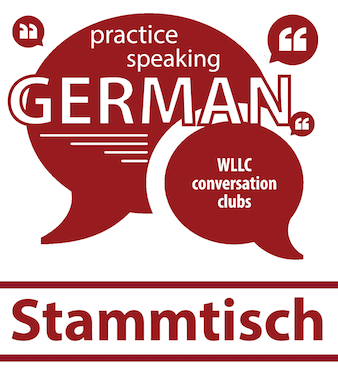
Stammtisch is a weekly conversation group held every Friday from 12:00-2:00 in the Arkansas Union.
Because we believe it is very important for our students to have the opportunity to practice their language skills in an everyday, conversational setting, the faculty and staff commit to attending Stammtisch every week. From native speakers to those who are learning German and just want to listen to some conversation, everyone is welcome. This is a low-key environment—we’re just chatting, so there’s no stress involved. Come and give it a try!
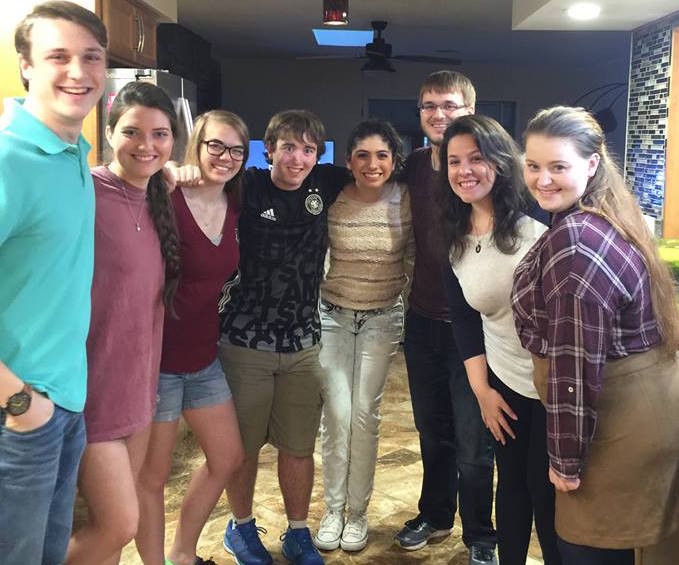
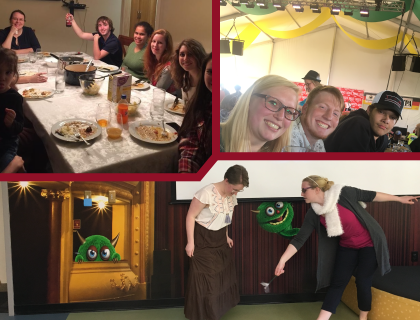
Wanderlust und Gemütlichkeit:
The University of Arkansas German Club
The German Club on campus is an organization where university students may participate in and learn about German language and culture. Our mission is to provide access to and foster a love for German language and culture through campus and community-wide programs.
Regular events include Spielabend (playing card and board games in German), a sausage grilling party in the park, and a film festival.
Useful German Resources and Websites
- ARD Nachrichten in 100 Sekunden
- German Youtube
- Quarks & Co. - Themen über Wissenschaft und Wissen.
- Das Beste Wenn Sie wenig Zeit haben, sollen Sie sich auf diesen Podcast konzentrieren. Er bietet eine Zusammenfassung der wichtigsten Nachrichten des Tages in knappen zehn Minuten. Von der Site: "Ein Best-Of aus den Sendungen der Bayern 2-radioWelt gibt es jeden Tag kurz vor Feierabend als Podcast."
- Bayern 2: Sozusagen „Bemerkungen zur (deutschen) Sprache.“
- radioWissen Alles, aber wirklich alles. Beispiele: Shakespeare, Florenz im Mittelalter, Mauern und Grenzen, Griechenland heute, die Stalinallee, jüdisches Leben in Regensburg, Willy Brandt, der Igel, Rapper/Gangster/Agitator, über die Freundschaft, Konrad Duden, u.s.w.
- Klaro Nachrichten fuer Kinder. (NICHT beleidigt sein! Die Kinder fassen die Themen kurz zusammen und laden Experten ein, die alles detailliert diskutieren.)

